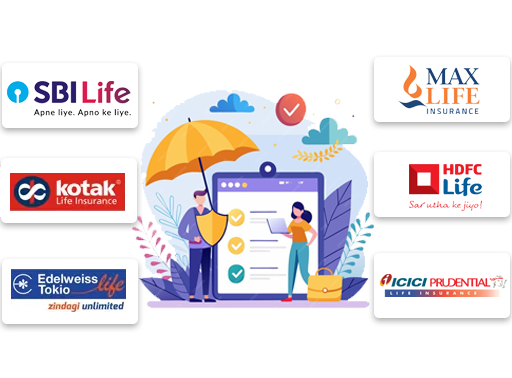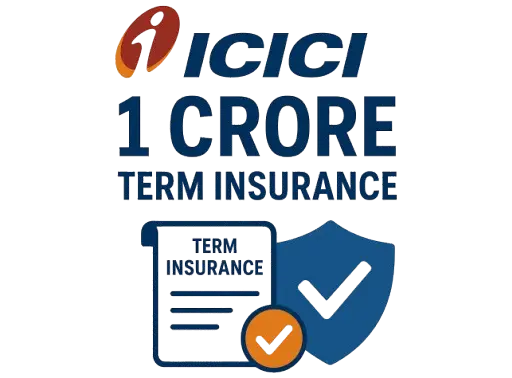- Eligibility of Term Insurance
- Documents Required
- Assessment Process Involved

Daina is a content writer with a profound grasp of Insurance, Stocks, and Business domains. Her extensive 3-year experience in the insurance industry equips her with a nuanced understanding of its intricacies. Her skills extend to crafting blogs, articles, social media copies, video scripts, and website content. Her ability to simplify complex insurance concepts into reader-friendly content makes her an expert in the domain.
Reviewed By:

Sharan Gurve has spent over 9 years in the insurance and finance industries to gather end-to-end knowledge in health and term insurance. His in-house skill development programs and interactive workshops have worked wonders in our B2C domain.
Updated on Jul 02, 2025 6 min read
Term Insurance Eligibility in India
In case of your unexpected death, term insurance can prove to be a vital financial product that will aid your family during difficult times. The policyholder’s beneficiaries will receive a predetermined sum assured if the insured passes away during the policy term. A popular choice among individuals in India for its affordability and the financial security it provides is term insurance. However, similar to every insurance offering, certain eligibility requirements and factors require consideration when applying for term insurance in the Indian context. Considering these factors is important when opting for a term insurance plan. This article aims to analyze the concept of eligibility for term insurance in greater depth. It explores the demands and numerous features that are at work.
Age Requirements
Term insurance eligibility in India is often based on age as a primary factor. Age limits typically apply to individuals seeking term insurance policies from insurance companies. The age requirement normally is set at 18 years as for the purpose of legally entering into a contract, being classified as an adult is mandatory. Insurance providers have different maximum age limits, but typically it is between 60-65 years. The premium for term insurance generally increases with age. Securing lower premiums is possible by purchasing a policy at a younger age.
Medical History and Health Condition
Determining term insurance eligibility in India heavily relies on an individual’s medical history and overall health condition. Assessment of an individual’s risk by insurance companies requires this crucial information. Applicants must reveal their medical history to insurance companies, who may request medical reports or conduct medical examinations. This is influenced by both the sum assured and the applicant’s age. If you have heart disease, diabetes, or cancer, your eligibility for term insurance and premium rates may be affected. One must communicate their pre-existing medical conditions when seeking term insurance.
By evaluating health conditions and medical history, insurance companies can determine the risks associated with providing coverage. Exclusions or higher premiums are sometimes imposed by insurers for people with certain health conditions. Make sure to provide precise medical history information for the policy to stay valid and so that claims do not get denied.
Lifestyle Habits
When evaluating term insurance eligibility, Insurers also consider applicants’ lifestyle habits. Participation in high-risk activities like extreme sports, smoking, and alcohol consumption can affect premium rates and coverage options. Considering these factors is important when selecting an insurance plan.
Usually, those who smoke or use tobacco are charged higher premiums than non-smokers. The development of health issues presents a higher risk for them. Likewise, high-risk activity participators might have to agree to certain exclusions in their policy or pay higher premiums. The validity of the policy depends on disclosing accurate information about your lifestyle habits so that claims are not denied owing to misrepresentation.
Financial Stability
Insurance providers could take into account the financial stability of applicants. The risk attached to the policy can be evaluated with this assistance. Insurers usually view people with a steady income and sufficient financial resources in a more favourable light. Their likelihood to default on premium payments is perceived as lower. The applicant’s financial stability assists the insurance company in evaluating the risk involved in offering coverage. It guarantees that the premiums can be paid uniformly during the entire policy period.
Occupation
Various occupations carry varying degrees of risks in the Indian setting. Assessing term insurance eligibility considers this by insurance companies. Hazardous or high-risk occupations such as miners, pilots, or construction workers might face higher premiums or exclusions in their policies. The chance of getting injured or dying in these professions is higher. The nature of their job makes accidents or fatalities more probable.
Low-risk occupation individuals may qualify for standard rates and coverage options. Accurately disclosing occupation information is crucial for ensuring that the policy remains valid.
Documents Required For Term Insurance Application
Generally, when procuring term insurance in India, there are particular documents that you will commonly have to give to the insurer. The completion of the application process requires these documents. The insurance company needs them to evaluate your eligibility and underwrite the policy. Commonly required documents for purchasing term insurance are listed below. Some documents may vary depending on the company:
- The insurance company’s application form needs to be filled out by you. This form has personal details like your name, address, and contact information along with date of birth, occupation and nominee details. Be sure to accurately and completely fill out the form.
- Identity Proof - Documentation that proves your identity will be required. Documents accepted usually comprise of the following:
- Aadhaar Card
- PAN Card
- Passport
- Voter ID Card
- Address Proof - Providing documentation is necessary to confirm your residential address. The acceptable documents usually consist of the following:
- Aadhaar Card
- Utility Bills
- Bank Statement
- Passport
- Income Proof - To determine your financial reliability, some insurance firms may ask you to supply income-related papers. This aids them in establishing the eligible coverage amount for you. In order to demonstrate acceptable income, these documents may be utilized
- Recent salary slips showing your monthly income can serve as income proof.
- Proof of income may be provided by displaying your ITR documents from the last few years.
- To demonstrate your income, utilize bank statements that indicate regular deposits.
- Medical Assessment Proof - Medical tests may be required by the insurance company depending on your age and sum assured. They could additionally solicit you for existing medical records. Your health condition can be assessed through these reports to decide the appropriate premium rates. The policies of the insurance company will determine which tests are required.
Term Plan Eligibility Assessment Process
When seeking term insurance in India, the process of evaluating eligibility typically follows these steps:
The insurance company requires the applicant to complete an application form that they have provided. The form must contain personal information, medical history, lifestyle habits, and other relevant details. To avoid any issues during the underwriting process, it’s crucial to offer precise and comprehensive data.
The application form for Medical Underwriting may lead to the insurance company requesting medical records. Medical tests are a possibility for the applicant. These tests might entail taking blood samples, analyzing urine samples, or performing other more extensive medical examinations. Medical underwriting aims to evaluate the health condition of the applicant. It aids in identifying any existing medical conditions that might impact approval and premium fees.
The insurance company evaluates the applicant’s overall risk before offering coverage. Age, medical history, lifestyle habits, occupation, policy duration and sum assured are evaluated in this process. The risk assessment enables the evaluation of the available coverage options and premium rates for the applicant.
The calculation of the premium amount by the insurance company depends upon risk assessment. A payment from the applicant will secure the term insurance policy. Age, lifestyle habits, health condition, occupation, sum assured, and policy duration all affect the premium. Those with a lower risk profile generally pay lower premiums compared to individuals with a higher risk profile.
After determining the premium and making the payment, the insurance company issues the term insurance policy. Meeting the eligibility requirements, the applicant is qualified. The terms and conditions, coverage details, and premium payment schedule are all outlined in the policy document.
In a Nutshell
If you pass away unexpectedly, term insurance is a crucial financial tool that can offer your loved ones financial protection. When it comes to eligibility for term insurance, multiple factors are considered such as age, medical history, lifestyle habits, occupation, financial stability, policy duration and sum assured. Disclosing precise information during the application process, irrespective of its impact on premium rates or coverage options, is crucial. Misrepresentation does not lead to claim rejection since it is ensured that the policy stays valid.
Those contemplating term insurance should thoroughly evaluate their needs, compare policies from diverse insurance providers, and consult with experts. This will support them in making an informed decision about their coverage. Comprehending the eligibility prerequisites and influencing factors is crucial in making sure that you choose a term insurance policy that meets your needs. It assures satisfactory economic shelter for your close ones.
Term Insurance Eligibility: FAQ
1. What paperwork is needed to apply for term insurance?
The insurer application form, identification evidence (such as an Aadhaar card or PAN card), address proof (such as utility bills or bank statements), income proof, and medical evaluation proof are frequently needed papers for term insurance applications.
2. How is eligibility for term plans determined throughout the application process?
An application form must be filled out, medical records must be provided, or a medical exam must be taken as part of the evaluation procedure, which also entails examining criteria including age, medical history, lifestyle habits, occupation, policy duration, and sum assured.
3. How does risk assessment affect the cost of term insurance?
The risk assessment is used to determine the premium amounts. In comparison to people with greater risk profiles, people who have lower risk profiles often pay cheaper rates.
4. After fulfilling the qualifying conditions, what happens?
Following confirmation of eligibility, the insured pays the premium, and the insurance company produces a term insurance policy with the terms, specifics of the coverage, and a payment schedule.
5. What should people take into account when determining their eligibility for term insurance?
Even if it has an impact on the cost of the premium or the available coverage options, it is crucial to submit accurate information throughout the application process. To choose term insurance coverage wisely, carefully assess your own requirements, compare policies, and get professional guidance.
Other Term Insurance Companies
Share your Valuable Feedback
4.6
Rated by 866 customers
Was the Information Helpful?
Select Your Rating
We would like to hear from you
Let us know about your experience or any feedback that might help us serve you better in future.


Written By: Daina Mathew
Daina is a content writer with a profound grasp of Insurance, Stocks, and Business domains. Her extensive 3-year experience in the insurance industry equips her with a nuanced understanding of its intricacies. Her skills extend to crafting blogs, articles, social media copies, video scripts, and website content. Her ability to simplify complex insurance concepts into reader-friendly content makes her an expert in the domain.






4509-1741341976.png)










4391-1741255269.png)





Do you have any thoughts you’d like to share?